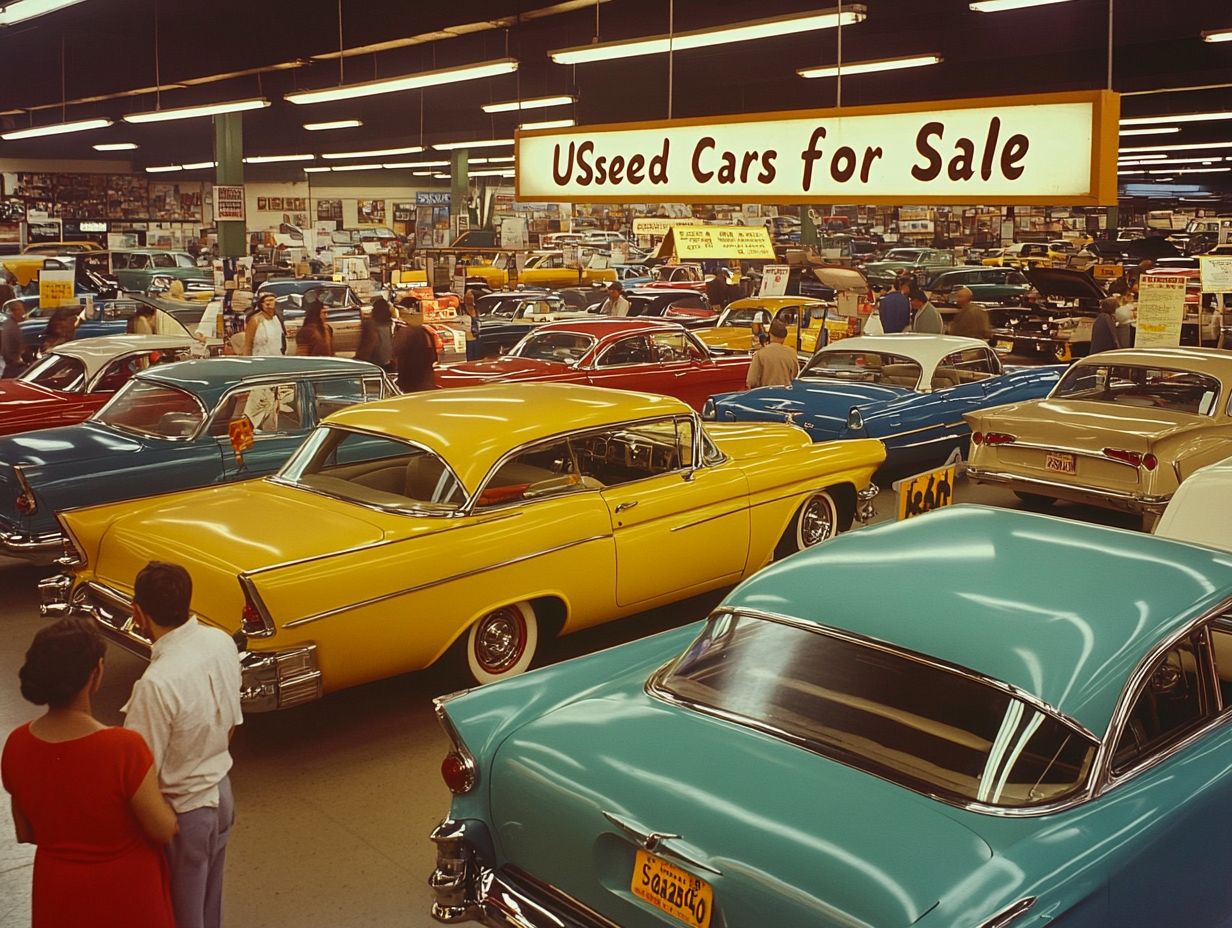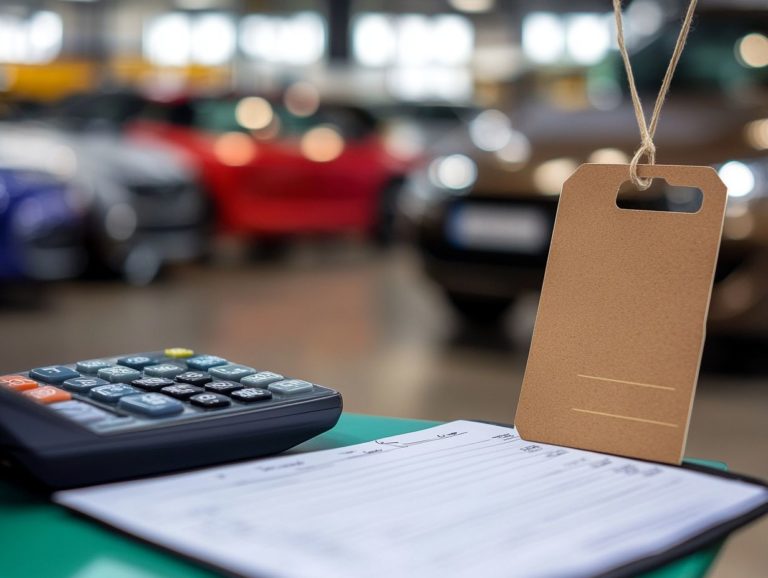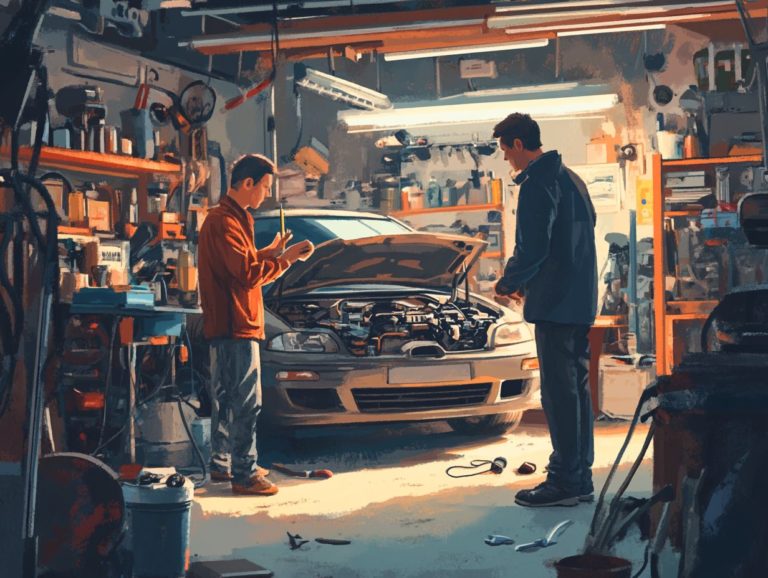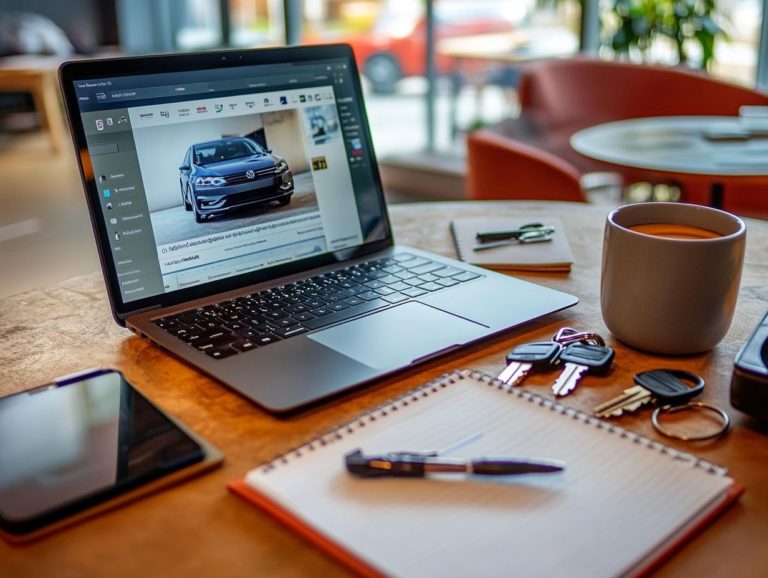The Pros and Cons of Buying Used Cars
Buying a used car can be a smart financial decision, but it’s vital to weigh the pros and cons before diving in.
While the allure of significant cost savings and a broader selection of vehicles may catch your eye, potential drawbacks like maintenance costs and outdated features deserve your attention.
This article explores the benefits of purchasing a used car, highlights the pitfalls to avoid, and outlines key factors to help you make an informed choice.
Whether you’re a first-time buyer or looking to upgrade, understanding these aspects will empower you to navigate the used car market confidently.
Contents
Key Takeaways:

- Used cars offer significant cost savings, making them a more affordable option for those on a budget.
- They have lower depreciation rates, helping you save money in the long run.
- You gain access to a wider range of options, including older models or rare vehicles.
What are Used Cars?
Used cars are pre-owned vehicles available at various dealerships or through private sales, providing diverse options for budget-conscious shoppers.
These vehicles come in a wide range of prices and conditions, appealing to those looking to save money while securing reliable transportation. Many used cars also offer certified pre-owned options that undergo thorough inspections and usually include limited warranties for your peace of mind.
Getting detailed vehicle history reports is crucial. They offer vital insights into past ownership, service records, and any accidents essential for making informed decisions.
For savvy shoppers, these elements boost your confidence in your purchase and optimize value, ensuring you get the best deal without sacrificing quality.
Benefits of Buying Used Cars
Purchasing used cars has many advantages that make them an appealing choice for discerning buyers, especially those mindful of their budgets.
One major benefit is the significantly lower depreciation that used cars experience. This helps you avoid the steep initial value drop typical of new vehicles.
The used car market offers a diverse range of models, allowing you to explore a wide selection, including luxury options that are much more attainable than their brand-new counterparts.
Cost Savings
The cost savings associated with used cars can significantly impact your financial decisions. By opting for a pre-owned vehicle, you ll enjoy a lower price tag than new cars, leading to more manageable monthly payments.
As a budget-conscious shopper, you can find reliable options in the used car market, resulting in greater financial flexibility and less strain on your budget.
On average, a used car can cost nearly 50% less than its new counterpart, providing an immediate reduction in out-of-pocket expenses. Lower monthly payments allow you to allocate resources to other essential aspects of life, like savings or investments. Additionally, insurance costs for used cars tend to be lower, enhancing your overall savings.
Surveys show that nearly 70% of buyers feel more financially secure after selecting a pre-owned vehicle, highlighting the long-term benefits of this choice. With all these factors at play, it s clear that making a prudent choice in the used car market offers significant advantages for effective financial management.
Lower Depreciation
One compelling reason to buy a used car is its lower depreciation rate. New cars can lose a lot of value in just a few years, while used cars often offer a more stable financial choice.
This means you can keep a larger portion of your investment over time. Sellers know that used cars can often command better resale prices than new ones.
As you explore the used car market, focus on models known for lower depreciation. This decision can lead to a better financial outcome in the long run.
More Options

The used car market offers a variety of choices. You can find different types of cars at various prices.
This diversity helps you explore options that match your personal style and driving needs.
With so many selections available, you can find unique vehicles that stand out from mainstream options. Whether you’re after a high-end sports car or a reliable SUV, you’ll feel empowered to make informed choices.
More options also help you negotiate better deals. This variety makes the search for your ideal vehicle not only achievable but genuinely enjoyable.
Drawbacks of Buying Used Cars
While used cars have many benefits, be aware of potential drawbacks. These can include maintenance costs, fewer advanced features, and hidden issues.
Each of these factors can affect your overall satisfaction with your purchase.
Potential Maintenance Costs
A key concern for any buyer is the potential maintenance costs after purchasing a used car. This is especially true if the vehicle hasn t had a thorough check-up.
Research the car’s history through detailed reports and pay attention to any irregularities during a test drive. A professional inspection can reveal hidden issues and save you from unexpected repair bills.
By taking these steps, you’ll feel more confident in your vehicle’s reliability. This leads to a more satisfying ownership experience.
Less Advanced Features
One potential drawback of purchasing a used car is that it might not have the same advanced features as newer models. This could impact your overall driving experience and specific needs. It’s essential for you to assess whether these limitations align with your expectations and requirements for safety and convenience.
Many contemporary vehicles come equipped with modern technology, such as advanced driver-assistance systems, state-of-the-art infotainment features, and fuel-efficient engines. These features can significantly enhance your comfort and safety on the road.
If you’re considering a used car, make sure to research and compare your options! Consider not just the price but also how the absence of these modern features might affect your daily commute or longer journeys. By prioritizing essential functionalities and being mindful of potential trade-offs, you can make informed choices that ensure your financial investment brings you both satisfaction and reliability.
Factors to Consider Before Buying a Used Car
Before you make that all-important purchasing decision, there are several crucial factors to consider when buying a used car.
You’ll want to delve into the vehicle’s history, conduct a thorough price comparison, and examine the warranty and return policies offered by the dealership. Understanding these elements can profoundly influence your overall satisfaction and the financial outcome of your purchase.
Vehicle History and Condition

The vehicle history is an essential element in your used car buying journey. It offers crucial insights into previous ownership, maintenance records, and any hidden issues that could impact the car’s reliability. A meticulous pre-purchase inspection can further uncover underlying problems that might not be reflected in the vehicle history report.
Recognizing the importance of these two steps can be transformative for you as a prospective buyer. It reveals how the vehicle has been treated over the years. From accident records to title discrepancies, the vehicle history report illuminates vital details that could save you from expensive repairs in the future.
A certified mechanic can identify potential mechanical issues, worn-out parts, or safety concerns that a casual look might overlook. By embracing these precautionary measures, you not only protect your investment but also enjoy peace of mind as you navigate the complexities of acquiring a used vehicle.
Price Comparison
Conducting a price comparison is essential for you as a buyer seeking the best deal in the used car market. This step ensures that you make an informed decision based on market standards and competitive pricing, helping you recognize fair value and avoid overpaying for a vehicle.
To effectively navigate the complexities of vehicle pricing, resources like Kelley Blue Book or Edmunds can provide you with invaluable insights into market trends and specific model values. Exploring various online platforms such as Autotrader or CarGurus will further enhance your understanding, as these sites often feature user-generated listings and customer reviews.
It s equally important for you to consider variables like mileage, condition, and geographical pricing variations, as these factors can significantly influence a car’s market value. By combining these resources and strategies, you can boost your confidence and ultimately make sound purchasing decisions that align perfectly with your budget.
By following these steps, you’ll make a confident choice for your next car!
Warranty and Return Policies
Understanding warranty and return policies is crucial for you as a buyer. These factors not only provide important consumer protection but also greatly affect your money choices when purchasing a used car. A solid warranty can cover potential repair costs and bolster your confidence in your decision.
As you explore the realm of used cars, you’ll encounter notable differences in how warranties and return policies are structured. Dealerships often offer more comprehensive warranties, sometimes even including limited service contracts.
In contrast, private sellers typically operate with minimal or no formal guarantees. This discrepancy can have major implications for your consumer protection, potentially leaving you vulnerable to unexpected expenses if you overlook the details in the policy.
Take the time to carefully review the details in the policy and ensure you understand what is covered. This diligence will safeguard your investment and provide peace of mind before you finalize the deal.
Frequently Asked Questions
-
What are the benefits of buying a used car?
There are several advantages to buying a used car, including a lower purchase price, lower insurance costs, and slower depreciation.
-
What are the drawbacks of purchasing a used car?
Used cars may have higher maintenance and repair costs, a shorter warranty period, and a higher risk of hidden issues.
-
Is it more cost-effective to buy a used car or a new car?
It depends on your personal financial situation and the specific car you are considering. Used cars generally have a lower initial cost but may have higher long-term costs due to potential repairs and maintenance.
-
What should I look for when buying a used car?
It’s important to thoroughly inspect the car’s condition, check its maintenance and repair history, and take it for a test drive to ensure it meets your needs and standards.
-
Are there any red flags to watch out for when buying a used car?
Yes, be cautious of cars with a suspiciously low price, a salvaged or rebuilt title, and signs of neglect or poor maintenance. Act quickly to avoid costly mistakes and be wary of high-pressure sales tactics.
-
How can I ensure I am getting a good deal on a used car?
Do your research on the average market value of the car you are interested in and compare prices from different sellers. It’s also important to negotiate the price and consider factors such as the car’s condition and mileage.
Make your purchase informed and stress-free!







